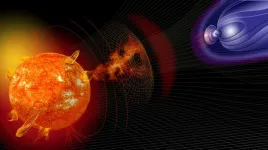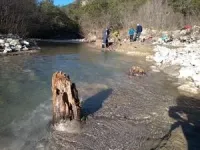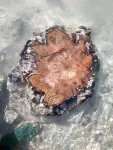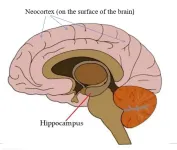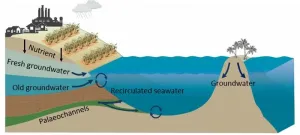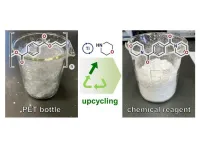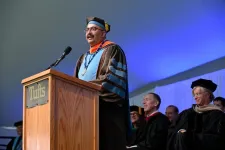(Press-News.org) An international team of scientists have discovered a huge spike in radiocarbon levels 14,300 years ago by analysing ancient tree-rings found in the French Alps.
The radiocarbon spike was caused by a massive solar storm, the biggest ever identified.
A similar solar storm today would be catastrophic for modern technological society – potentially wiping out telecommunications and satellite systems, causing massive electricity grid blackouts, and costing us billions of pounds.
The academics are warning of the importance of understanding such storms to protect our global communications and energy infrastructure for the future.
The collaborative research, which was carried out by an international team of scientists, is published today (Oct 9) in The Royal Society’s Philosophical Transactions A: Mathematical, Physical and Engineering Sciences and reveals new insights into the Sun’s extreme behaviour and the risks it poses to Earth.
A team of researchers from the Collège de France, CEREGE, IMBE, Aix-Marseille University and the University of Leeds measured radiocarbon levels in ancient trees preserved within the eroded banks of the Drouzet River, near Gap, in the Southern French Alps.
The tree trunks, which are subfossils – remains whose fossilization process is not complete – were sliced into tiny single tree-rings. Analysis of these individual rings identified an unprecedented spike in radiocarbon levels occurring precisely 14,300 years ago. By comparing this radiocarbon spike with measurements of beryllium, a chemical element found in Greenland ice cores, the team proposes that the spike was caused by a massive solar storm that would have ejected huge volumes of energetic particles into Earth’s atmosphere.
Edouard Bard, Professor of Climate and Ocean Evolution at the Collège de France and CEREGE, and lead author of the study, said: “Radiocarbon is constantly being produced in the upper atmosphere through a chain of reactions initiated by cosmic rays. Recently, scientists have found that extreme solar events including solar flares and coronal mass ejections can also create short-term bursts of energetic particles which are preserved as huge spikes in radiocarbon production occurring over the course of just a single year.”
The researchers say that the occurrence of similar massive solar storms today could be catastrophic for modern technological society, potentially wiping out telecommunications, satellite systems and electricity grids - and costing us billions of pounds. They warn that it is critical to understand the future risks of events like this, to enable us to prepare, build resilience into our communications and energy systems and shield them from potential damage.
Tim Heaton, Professor of Applied Statistics in the School of Mathematics at the University of Leeds, said: “Extreme solar storms could have huge impacts on Earth. Such super storms could permanently damage the transformers in our electricity grids, resulting in huge and widespread blackouts lasting months. They could also result in permanent damage to the satellites that we all rely on for navigation and telecommunication, leaving them unusable. They would also create severe radiation risks to astronauts.”
Nine such extreme solar storms – known as Miyake Events – have now been identified as having occurred over the last 15,000 years. The most recent confirmed Miyake Events occurred in 993 AD and 774 AD. This newly-identified 14,300-year-old storm is, however, the largest that has ever been found – roughly twice the size of these two.
The exact nature of these Miyake Events remains very poorly understood as they have never been directly observed instrumentally. They highlight that we still have much to learn about the behaviour of the Sun and the dangers it poses to society on Earth. We do not know what causes such extreme solar storms to occur, how frequently they might occur, or if we can somehow predict them.
Professor Bard said: “Direct instrumental measurements of solar activity only began in the 17th century with the counting of sunspots. Nowadays, we also obtain detailed records using ground-based observatories, space probes, and satellites. However, all these short-term instrumental records are insufficient for a complete understanding of the Sun. Radiocarbon measured in tree-rings, used alongside beryllium in polar ice cores, provide the best way to understand the Sun’s behaviour further back into the past.”
The largest, directly-observed, solar storm occurred in 1859 and is known as the Carrington Event. It caused massive disruption on Earth – destroying telegraph machines and creating a night-time aurora so bright that birds began to sing, believing the Sun had begun to rise. However, the Miyake Events (including the newly discovered 14,300-yr-old storm) would have been a staggering entire order-of-magnitude greater in size.
Professor Heaton said: “Radiocarbon provides a phenomenal way of studying Earth’s history and reconstructing critical events that it has experienced. A precise understanding of our past is essential if we want to accurately predict our future and mitigate potential risks. We still have much to learn. Each new discovery not only helps answer existing key questions but can also generate new ones.”
Cécile Miramont, Associate Professor of Paleoenvironments and Paleoclimates at IMBE, Aix-en-Provence University, said: “Finding such a collection of preserved trees was truly exceptional. By comparing the widths of the individual tree rings in the multiple tree trunks, we then carefully pieced together the separate trees to create a longer timeline using a method called dendrochronology. This allowed us to discover invaluable information on past environmental changes and measure radiocarbon over an uncharted period of solar activity.”
For more information please contact the University of Leeds press office at pressoffice.adm@leeds.ac.uk
Further Information
A radiocarbon spike at 14,300 cal yr BP in subfossil trees provides the impulse response function of the global carbon cycle during the Late Glacial by Bard E, Miramont C, Capano M, Guibal F, Marschal C, Rostek F, Tuna T, Fagault Y, Heaton TJ, is published in Philosophical Transactions of the Royal Society A, on October 9. 381: 20220206 (2023). https://doi.org/10.1098/rsta.2022.0206 (link will go live after publication)
Funding for this research was provided by the Collège de France, the EQUIPEX ASTER-CEREGE and the ANR projects CARBOTRYDH and MARCARA (PI E.B.); the Natural Environment Research Council; and The Leverhulme Trust.
Pictures available via: https://we.tl/t-RzHSir3gM9
Captions and credits:
“NASA Solar Flare graphic” caption: Artist illustration of events on the sun changing the conditions in Near-Earth space. Photo Credit: NASA
Subfossil trees in the Drouzet river. Photo Credit: Cécile Miramont
Subfossil trees in the banks of the Drouzet river. Photo Credit: Cécile Miramont
Tree rings of a buried subfossil tree in the Drouzet river. Photo Credit: Cécile Miramont
University of Leeds
The University of Leeds is one of the largest higher education institutions in the UK, with more than 39,000 students from 170 different countries. We are renowned globally for the quality of our teaching and research.
We are a values-driven university, and we harness our expertise in research and education to help shape a better future for humanity, working through collaboration to tackle inequalities, achieve societal impact and drive change.
The University is a member of the Russell Group of research-intensive universities, and is a major partner in the Alan Turing, Rosalind Franklin and Royce Institutes www.leeds.ac.uk
END
Researchers identify largest ever solar storm in ancient 14,300-year-old tree rings
2023-10-09
ELSE PRESS RELEASES FROM THIS DATE:
Should a more individualized model replace the current method for determining which people should be screened for lung cancer?
2023-10-09
A new study found that an alternative model to identify patients with lung cancer eligible for screening was more accurate than the currently used method based on the United States Preventive Services Task Force (USPSTF) criteria. The results are published by Wiley online in CANCER, a peer-reviewed journal of the American Cancer Society.
Lung cancer is the leading cause of cancer deaths, and using low-dose computed tomography scans to screen people who are at elevated risk for lung cancer reduces lung cancer deaths. The USPSTF criteria use age and smoking history to determine ...
Is this how antidepressants work, and why they take weeks to kick-in?
2023-10-09
Type of work: peer-reviewed/randomised controlled trial/people
SSRI antidepressants normally take a few weeks before any showing mental health benefits, but how come it takes so long? Now a study from a group of clinicians and scientists provides the first human evidence that this is due to physical changes in the brain leading to greater brain plasticity developing over the first few weeks of SSRI intake. This may also begin to explain one of the mechanisms of how antidepressants work.
This work is presented at the ECNP conference in Barcelona on 9th October. This ...
Teaching expectant mothers to bond with their babies
2023-10-09
Type of work: Peer-reviewed / experimental study / people
Up to a third of mothers don’t bond well with their babies after birth, causing intense emotional distress to both mother and baby1. Now researchers have found that they can train at-risk expectant mothers to recognise and regulate emotions better, potentially reducing their risk of postpartum depression.
Presenting the work at the ECNP Congress in Barcelona, researcher Dr Anne Bjertrup said:
People generally have an automatic tendency to see the positive or negative in any situation. In previous studies we saw that certain ...
Young children who are close to their parents are more likely to grow up kind, helpful and ‘prosocial’
2023-10-09
A loving bond between parents and their children early in life significantly increases the child’s tendency to be ‘prosocial’, and act with kindness and empathy towards others, research indicates.
The University of Cambridge study used data from more than 10,000 people born between 2000 and 2002 to understand the long-term interplay between our early relationships with our parents, prosociality and mental health. It is one of the first studies to look at how these characteristics interact over a long period spanning childhood and adolescence.
The researchers ...
The hidden scars: Stigmatization a major impact of skin diseases across Europe
2023-10-09
(Lugano, Monday, 9 October 2023) A major pan-European study has revealed that almost all patients affected by skin diseases face embarrassment, with the psychological burden compounding the physical impact of living with the disease.1,2
The Burden of Skin Disease in Europe, published today in the Journal of the European Academy of Dermatology and Venereology (JEADV), analysed 19,015 individuals with a range of skin diseases and revealed the huge psychological toll of living with a disease. The diseases examined included, amongst others, fungal skin infections, acne, atopic dermatitis (eczema), alopecia, psoriasis and sexually transmitted diseases (STDs).
With high levels of stigmatisation, ...
Discovery of invisible nutrient discharge on Great Barrier Reef raises concerns
2023-10-08
Scientists using natural tracers off Queensland’s coast have discovered the source of previously unquantified nitrogen and phosphorous having a profound environmental impact on the Great Barrier Reef.
The findings, published today in Environmental Science and Technology, indicate current efforts to preserve and restore the health of the Reef may require a new perspective.
Southern Cross University’s Dr Douglas Tait leads the ground-breaking study, ‘Submarine groundwater discharge exceeds river inputs as a source of nutrients to the Great Barrier Reef’.
Submarine ...
Scientists upcycle polyesters through new waste-free, scalable process
2023-10-07
Tokyo, Japan – Researchers from Tokyo Metropolitan University have developed a new chemical process which upcycles polyesters, including PET in plastic bottles, to morpholine amide, a versatile and valuable building block for synthesizing a vast range of compounds. The reaction is high yield, waste-free, does not require harmful chemicals, and is easily scalable. The team successfully break the often costly closed-loop recycling loop of plastic waste, allowing upcycling to more valuable products.
Recycling plays an indispensable part of our fight against plastic waste. But at what ...
Tufts University president Sunil Kumar aims to spread the light beyond the hill
2023-10-07
Under overcast skies that stood no chance of clouding the celebratory tone of the day, hundreds of faculty, staff, students, alumni, neighbors, and academic leaders gathered today on the Medford/Somerville campus to witness the inauguration of Sunil Kumar as the 14th president of Tufts University. He succeeds Anthony P. Monaco, who served as president for 12 years.
Delegates from more than 85 academic institutions and learned societies around the world attended Kumar’s inauguration ceremony on the residential quad. The ceremony ...
Antidepressants versus running for depression: is there a winner?
2023-10-07
Type of work: peer-reviewed/experimental study/people
The first study to compare effects of antidepressants with running exercises for anxiety, depression and overall health shows that they have about the same benefits for mental health – but a 16-week course of running over the same period scores higher in terms of physical health improvement, whereas antidepressants lead to a slightly worse physical condition, as has been suggested by previous studies. However, the drop-out rate was much higher in the group which initially ...
Wearable bracelet tracks bipolar mood swings: changing electrical signals in skin linked to manic or depressed moods
2023-10-07
Not peer-reviewed/experimental study/people
Researchers have announced preliminary results of using wearable technology to measure electrical impulses in the skin and other physiological biomarkers which might be associated with mood changes in bipolar disorder. The work is at an early stage, but they hope that they will be able to build on these patterns to detect mood swings in bipolar disorder sufferers, so helping in diagnosis and potentially offering more rapid and personalized treatments.
Bipolar disorder (formerly called manic-depressive illness or manic depression) is a mental illness that causes swings in a ...
